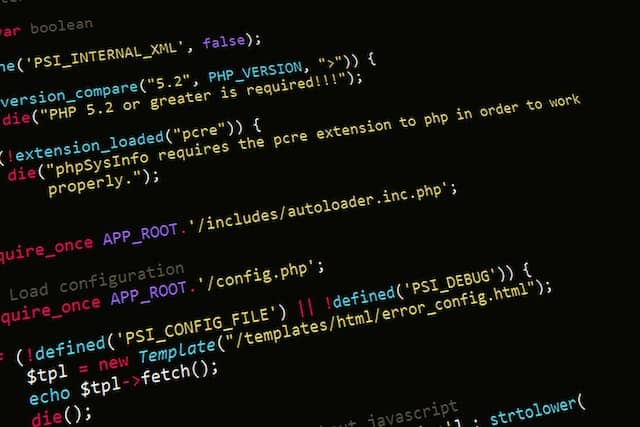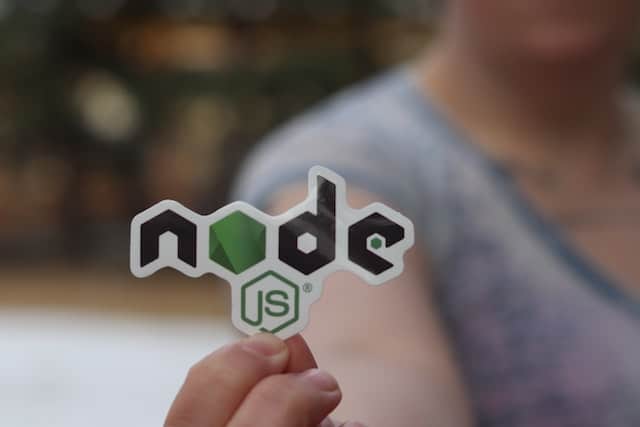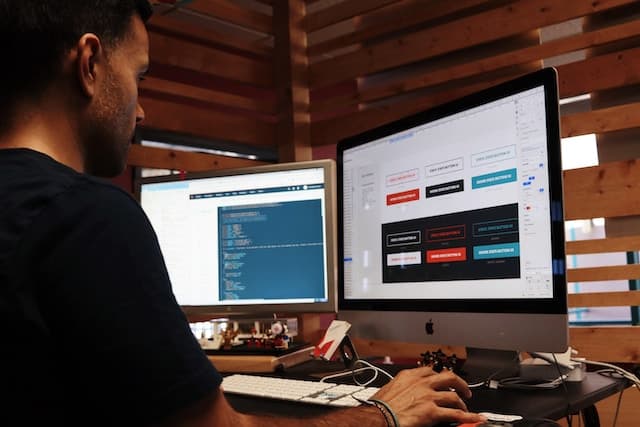Are you ready to embark on a journey toward becoming a proficient Full Stack Developer? You can try FreeCodeCamp Full Stack Web Development course. We will guide you through FreeCodeCamp’s comprehensive curriculum. It can help you to become a skilled Full Stack Developer.
Full Stack Web Development encompasses a broad range of skills. That includes front end development, back end programming, and database management. With FreeCodeCamp, you can dive deep into these components. You can equip yourself with the knowledge and practical experience necessary to excel in the field.
We will start by understanding the core concepts of Full Stack Development. You will learn the important skills and technologies involved. We will also learn the importance of constant learning. Then, we’ll explore how to get started with FreeCodeCamp.
What is Full Stack Web Development?
Full Stack Web Development involves the creation of a dynamic and interactive web page. It seamlessly integrates the front end, back end, and database components. It requires proficiency in both client side and server side coding.

Practicing how to write codes in laptop
Three Main Components of Web Development
Front-End: The front-end is responsible for the visual and interactive elements of a web page. It involves HTML, CSS, and JavaScript. It enables the creation of user interfaces and interactivity.
Back-End: The back-end handles the server-side logic and functionality of a web application. It involves coding languages. For example, Python, Node.js, or Ruby, and frameworks like Express or Django. That can handle data processing, server management, and application logic.
Database: The database stores and manages the data required by the web application. Common databases include MySQL, MongoDB, or PostgreSQL, which store and retrieve data efficiently.
The Importance of Mastering All Components
To become a successful Full Stack Developer, it is important to gain proficiency in all three components. A front end developer can build more efficient web applications if he knows back end development.
Similarly, a back end developer who understands front end principles can ensure seamless integration. It can enhance the overall user experience. By mastering the entire stack, coders can effectively communicate with team members. They can also work with team members and tackle complex development challenges. Proficiency in all of these can help to get your first job in this sector.
What Skills and Technologies Do You Need?
- Full Stack Web Development requires a diverse set of skills. That includes:
- Skill in HTML, CSS, and JavaScript for front end development.
- Knowledge of coding languages like Python, JavaScript, or Ruby for back end development.
- Understanding of database management and querying languages like SQL.
- Problem-solving and debugging skills to identify and fix issues throughout the development process.
- Familiarity with version control systems like Git to work with other developers.
Key Technologies Used in Each Component
Front-End: Front-end developers use HTML, CSS, and JavaScript. They also use libraries and frameworks like React, Angular, or Vue.js. With these, they can create interactive and responsive user interfaces.
Back-End: Back-end developers work with programming languages like Python, JavaScript (Node.js), or Ruby. They use frameworks such as Express, Django, or Ruby on Rails. This can help to build the server side logic and handle requests from the front end.
Database: Database management systems like MySQL, MongoDB, or PostgreSQL are used to store, regain, and manage data efficiently for web applications.

Designing plan for front end of a website
The Importance of Continuous Learning and Staying Updated:
In the rapidly growing field of web development, constant learning is crucial. Staying updated on trends and best practices enables competitive, high quality solution delivery. A computer science degree is not mandatory for success as a full stack developer. If you have one, it can be helpful to you. Free Code Camp, for example, offers a comprehensive module. It covers all the important skills and technologies required for Full Stack Web Development.
Getting Started with FreeCodeCamp Full Stack Web Development
FreeCodeCamp is a non profit organization. It aims to make coding education accessible to everyone. Started as an interactive platform for coding challenges and lessons for aspiring developers. Over the years, it has evolved into a comprehensive module. It covers various web development topics.
Core Features and Benefits of FreeCodeCamp Full Stack Web Development
FreeCodeCamp offers many features and benefits. That makes it an excellent resource for aspiring developers. Particularly front end developers who are seeking to kickstart their careers. Some key functions include:
Extensive curriculum: FreeCodeCamp’s module covers a wide range of topics, from basic HTML and CSS to advanced algorithms and data structures.
Hands-on projects: The module includes project based learning, allowing students to apply their knowledge by building real world web applications.
Interactive coding challenges: FreeCodeCamp provides coding challenges and exercises that reinforce learning and improve coding skills.
Coding certifications: FreeCodeCamp offers certifications for completing sections of the module, which can boost job prospects and credibility.
Community-Driven and Supportive Environment
One of the greatest strengths of FreeCodeCamp is its community driven nature. Learners can interact with a vast community of fellow coders, and mentors. They volunteer through forums, chat rooms, and local coding groups. The supportive environment allows for collaboration, networking, and receiving feedback on projects.
Many Free Code Camp graduates have attributed their success to the supportive community. The community can help them overcome challenges. It also helps to land their first job as a front end developer.
Navigating the FreeCodeCamp Curriculum
Structure of the FreeCodeCamp Curriculum
The FreeCodeCamp full stack web development module is structured into various sections. Each section focuses on a specific topic or skill set. The module is divided into Responsive Web Design, JavaScript Algorithms and Data Structures, Front End Development Libraries, Data Visualization, APIs and Microservices, and Information Security and Quality Assurance. Each section comprises a series of lessons, coding challenges, and projects. It can help to reinforce learning.
Different Sections and Certifications
Free Code Camp offers certifications for completing each section of the module. Upon completion of Responsive Web Design, students receive a front end development certificate. These certifications can be showcased on resumes or professional networking platforms. It helps students stand out to potential employers.
Tips for Utilizing the Curriculum and Tracking Progress
To effectively utilize the Free Code Camp module and track progress, consider the following tips:
Set specific goals: Define what you want to achieve and break down the module into manageable chunks.
Consistency is key: Dedicate regular time to learning and practicing coding skills to build momentum and keep knowledge.
Engage with the community: Use the Free Code Camp forums and chat rooms to seek help, work together, and gain valuable insights.
Track progress: Free Code Camp provides a progress tracker. It allows students to check their advancement through the module and stay motivated.
Front-End Development with FreeCodeCamp

Learn HTML and CSS with FreeCodeCamp Full Stack Web Development Course
The Importance of HTML and CSS in Building the User Interface
As a front end developer, mastering HTML and CSS is crucial. It can create a visibly charming and interactive web page. HTML provides the structure and content of a web page. CSS controls the presentation and layout. Together, they form the foundation of the user interface. It determines how the web page looks and behaves. Proficiency in HTML and CSS allows a front end developer to translate design concepts into practical web experiences.
FreeCodeCamp Curriculum for HTML and CSS
The freeCodeCamp full stack web development module offers comprehensive lessons on HTML and CSS. It starts from the basics and gradually progresses to more advanced topics. The module covers HTML elements, attributes, semantic markup, responsive design, and more. Students receive hands on coding challenges. They also get projects to reinforce their understanding and practical skills.
Resources and Tips for Mastering Front-End Design
To excel in front end design, consider the following resources and tips:
Practice regularly: Consistent practice is key to mastering HTML and CSS. Build web pages, and experiment with different layouts and styles. Challenge yourself with creative projects.
Learn from real-world examples: Study well-designed websites and dissect their HTML structure and CSS styles. Analyze how different elements are organized and styled to gain inspiration and insights.
Leverage additional learning resources: Free Code Camp offers additional resources like articles, documentation, and video tutorials. It can help to deepen your knowledge. Explore online forums and communities to seek advice. You can share ideas and learn from an experienced web developer through it.
JavaScript and Front-End Libraries/Frameworks
Introducing JavaScript for Interactive Web Development
JavaScript is a universal coding language. It empowers a front end developer to create dynamic and interactive web experiences. Javascript enables functionalities such as form validation, animations, and event handling. It also allows manipulating web page content in real time. As a front end developer, learning JavaScript is crucial. It is for enhancing the user experience and adding interactivity to web pages.
Highlighting Popular Front-End Libraries/Frameworks
Front-end libraries and frameworks have gained significant popularity in the web development community. Some of them are React, Angular, and Vue.js. They provide powerful tools and abstractions that simplify and accelerate the development process.
React, for instance, enables the building of reusable UI components. Angular offers a comprehensive development ecosystem. Vue.js provides a lightweight and intuitive framework.
FreeCodeCamp Curriculum for JavaScript and Front-End Frameworks
Free Code Camp’s module includes an in depth section on JavaScript. It covers variables, functions, control flow, and object oriented programming. It can work with APIs. Students also have the opportunity to dive into popular front end frameworks. For example, React and Angular. They can explore their core concepts and practical implementation.
Exploring Additional Resources for Deepening Knowledge and Practical Application
To enhance your skills in JavaScript and front end frameworks, consider the following resources:
- The respective libraries or web frameworks provide online tutorials and documentation.
- Community-driven forums and discussion groups where you can seek guidance and share experiences. You can also learn from other web developers.
- Open-source projects on platforms like GitHub. That provides real world examples and opportunities to contribute and work with other developers.
Back-End Development with FreeCodeCamp

Node.Js is a Javascript Web Famework
Server-Side Programming Languages
Server side languages help to maintain the back end and the database. There are some common server side languages. We will show you some of them and also recommend you the best server side language.
Common Server-Side Programming Languages
Back-end development includes server side coding. Data processing, logic implementation, and server management take place here. Popular server side coding languages include Node.js, Python, and Ruby.
Node.js has gained immense popularity due to its event driven and non blocking nature. That makes it highly efficient for handling concurrent requests. Python, known for its readability and versatility, is widely used in web development. Ruby, with its elegant syntax and emphasis on coder happiness, is favored by many coders for its ease of use.
FreeCodeCamp Curriculum for Server-Side Programming
FreeCodeCamp full stack web development module covers server side coding with Node.js, Express.js, and MongoDB. It offers comprehensive lessons and hands on projects. Learners gain an understanding of routing, server configuration, and middleware usage. They also gain knowledge of database integration and API development. Through end to end projects like blogs or social media apps, students gain back end development experience.
Recommendations for Practicing and Expanding Back-End Skills
To further enhance back end skills, consider the following recommendations:
Building personal projects: Develop back-end projects on your local machine. Explore different functionalities and integrate various technologies. This allows for hands on practice and the opportunity to tackle real world challenges.
Collaborating with other developers: Engage in open-source projects or join coding communities. It will help you to work with experienced coders. Working on group projects provides valuable insights. It will improve teamwork and exposes you to diverse coding practices.
Exploring online courses: Supplement your learning with online courses that focus on specific server-side programming languages or frameworks. These courses can provide in depth knowledge and practical examples to deepen your understanding. It can help get jobs from junior developers to more senior positions in the field.
Databases and Data Management in FreeCodeCamp Full Stack Web Development
Importance of Databases in Web Development
Databases play a crucial role in web development. It stores and manages data for applications. They provide a structured approach to store, back up, update, and query data efficiently. Databases provide persistent and organized storage for web applications. That includes user info and product catalogs.
Popular Databases
Popular databases used in web development include MySQL, MongoDB, and PostgreSQL. MySQL is a robust relational database management system. Developers use it for its performance and scalability.
MongoDB is a flexible NoSQL database. It offers document based storage and dynamic schema capabilities. PostgreSQL is an open source relational database. It is famous for its advanced functions, reliability, and extensibility.
FreeCodeCamp Curriculum for Databases and Data Management
FreeCodeCamp full stack web development module covers databases and data management. That includes lessons on database models, querying, and integration with back end applications. Learners gain hands on experience in database integration by working on projects like a book trading club or stock price checker.
Additional Resources for Mastering Database Concepts and Querying
To deepen your knowledge of databases and querying, consider the following resources:
- Documentation and lessons by the respective database systems.
- Online courses or lessons focused on database management and query optimization.
- Practice platforms that offer interactive challenges to improve your skills in writing efficient database queries.
Full Stack Projects and Certifications

Project-Based Learning
Project based learning means working on a specific project. We will show you the importance and certification of Free Code Camp.
Significance of Project-Based Learning in Full Stack Development
Project-based learning is a crucial aspect of becoming a full stack developer. It allows students to apply their knowledge and skills to real world views. It copies the challenges they will face in their professional careers. Aspiring coders gain hands on experience and develop problem solving abilities. When they build projects, they can strengthen their understanding of how different elements of a full stack application work together.
FreeCodeCamp’s Project-Focused Curriculum and Benefits
FreeCodeCamp’s module is project focused. It provides students with a collection of real world projects to build. Each project is carefully designed to cover specific aspects of full stack development. For example, front end design, back end functionality, API integration, and database management. By completing these projects, students gain a comprehensive understanding of building full stack applications. They can develop a diverse portfolio to show their skills to potential employers.
Examples of Full Stack Projects and Their Relevance to Real-World Scenarios
Full stack projects can range from building e commerce platforms and social networking applications. It helps them to create collaborative task management systems and content management systems. These projects copy real world views. It allows students to tackle various challenges of front end and back end functionalities. Building these projects helps a learner gain the practical experience to become a full stack developer.
Earning Certifications With FreeCodeCamp Full Stack Web Development Programme
Certification Process Offered by FreeCodeCamp
FreeCodeCamp offers certifications for finishing specific sections of its module. It also offers to build a set of required projects. These certifications are the proof of skill in various aspects of full stack development. To earn certification, students must complete the required coding challenges and the final project.
Benefits of Earning Certifications and Their Impact on Career Prospects
Earning a certificate from FreeCodeCamp carries several benefits for aspiring full stack developers. Firstly, certificates confirm your skills and knowledge. It provides a real credential to enhance your resume and attract potential employers. They show your commitment to learning and ability to build full stack applications. Additionally, a certificate from FreeCodeCamp can open doors to job opportunities. Many employers recognize and value the practical experience gained through the module.
Tips for Successfully Completing FreeCodeCamp’s Certification Projects
To successfully complete FreeCodeCamp’s certification projects, consider the following tips:
Plan and organize your time: Break down the project into manageable tasks. Divide the time for each task to stay on track.
Use available resources: Use the FreeCodeCamp forums, documentation, and extra learning resources. It will help you to pass challenges and gain ideas.
Test and debug thoroughly: Ensure your projects are error free and functional by thoroughly testing and debugging your code.
Seek feedback and iterate: Take advantage of the supportive community. Seek feedback on your projects. Use constructive criticism to improve and refine your work.
Conclusion
Becoming a full stack web developer through FreeCodeCamp opens up possibilities and opportunities. We have showed the intricacies of full stack web development.
By mastering the components of web development, you can build dynamic web applications. The project focused approach of FreeCodeCamp allows you to apply your knowledge in practical ways. If you learn front end development, you can design a charming website with HTML, CSS, and Javascript. You can handle the database and the back end if you learn back end web development. A full stack developer can handle both of them. A full stack coder can build a website that runs easily and is visibly charming.
As you progress, work on projects, and earn certifications, confidence, and accomplishment grow. However, remember that the journey of a full stack developer is an ongoing process of constant learning and adaptation. You can become a full stack developer by completing a course from FreeCodeCamp.
